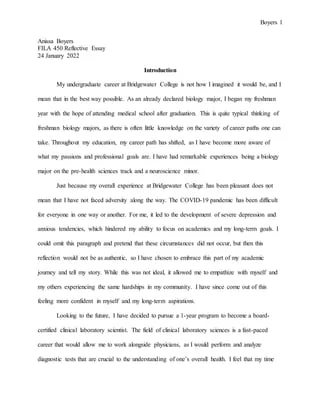Reflective essays are a unique genre of academic writing that encourages individuals to explore their thoughts, experiences, and emotions. These essays provide a platform for self-examination, personal growth, and critical thinking. Whether you are a student, professional, or someone simply interested in enhancing self-awareness, learning how to write a this essay can be a valuable skill.

Table of Contents
Structure of a Reflective Essay
A well-structured reflective essay typically comprises the following components:
- Introduction: Begin with a captivating hook or a brief anecdote that sets the stage for your reflection. Introduce the subject matter and provide a concise overview of your experiences or thoughts.
- Body Paragraphs: The body of your essay should contain your reflections and analysis. Typically, three to five paragraphs are sufficient. Each paragraph should focus on a specific aspect or experience related to your reflection.
- Personal Reflection: Share your thoughts, feelings, and insights about the subject matter. Be honest and vulnerable in expressing your emotions and reactions.
- Analysis: Go beyond mere description and analyze your experiences. Consider the significance of these experiences, how they have impacted you, and what you have learned from them.
- Conclusion: Summarize your key points and restate the significance of your reflection. End with a thought-provoking statement or a call to action.
Tips for Writing a Reflective Essay
- Choose a Meaningful Topic: Select a topic that holds personal significance or has had a profound impact on your life. Authenticity is critical in reflective writing.
- Be Honest and Vulnerable are an opportunity to be candid about your emotions and thoughts. Don’t shy away from sharing your true feelings.
- Use Descriptive Language: Paint a vivid picture for your readers by using descriptive language. Help them visualize your experiences and emotions.
- Reflect on Both Positive and Negative Experiences: Reflection isn’t limited to positive experiences. Explore how challenges and setbacks have shaped you as well.
- Provide Evidence: Support your reflections with specific examples, anecdotes, or incidents from your life.
- Show Growth and Learning: Reflect on how you have grown or what you have learned from your experiences. Highlight personal development.
- Edit and Proofread: Revise your essay for clarity, grammar, and punctuation errors. A well-edited essay enhances its impact.
Reflective Essay Topics
Need inspiration for your reflective essay? Here are 25 reflective essay topics to consider:
- A life-changing travel experience.
- The role of a mentor in your personal development.
- The impact of a book or movie on your perspective.
- Overcoming a fear or phobia.
- A significant personal achievement.
- The lessons learned from a failed project.
- The role of family in shaping your identity.
- How you’ve evolved as a learner over the years.
- A difficult decision you had to make.
- The influence of culture on your values.
- The importance of resilience in your life.
- The role of hobbies in reducing stress.
- An encounter with diversity that broadened your horizons.
- A challenging relationship and its impact on you.
- The significance of personal goals in your life.
- The transition from adolescence to adulthood.
- The impact of technology on your daily life.
- The lessons learned from a past mistake.
- The role of spirituality in your life.
- A memorable volunteering experience.
- The journey of self-discovery.
- Coping with the loss of a loved one.
- The influence of peers on your choices.
- The role of humor in handling adversity.
- The pursuit of happiness and its challenges.
Pitfalls of a Reflective Essay
While reflective essays can be gratifying, there are common pitfalls to watch out for:
- Superficial Reflection: Avoid merely summarizing events or experiences. Dive deep into your thoughts and emotions.
- Lack of Structure: Ensure your essay follows a clear structure to guide readers through your reflection.
- Overly Negative or Positive Bias: Balance your reflections by acknowledging both positive and negative aspects of an experience.
- Lack of Specificity: Provide concrete examples and details to support your reflections.
- Failure to Connect to a Broader Theme: Reflect on how your experiences relate to broader themes, such as personal growth or societal issues.
- Ignoring the Editing Process: Rushing through editing can result in errors that distract from your message.
In conclusion, writing a reflective essay can be a transformative journey of self-discovery. By following the suggested structure tips and exploring real-life examples, you can create a compelling and insightful reflective essay. Use the provided topic ideas as a starting point, and remember to avoid common pitfalls to make your essay truly shine. Happy reflecting!
Ten Reflective Essay Examples
1. Personal Growth Through Adversity: This essay reflects on how the author’s experiences with adversity and challenges have led to personal growth and resilience.
2. The Teacher Who Changed My Life: This reflective essay explores the profound impact of a particular teacher on the author’s academic and personal development.
3. Discovering Cultural Identity: The essay delves into the author’s journey of self-discovery and how their cultural background has influenced their identity.
4. From Student to Professional: It reflects on the transition from being a student to a working professional, discussing the challenges and learning experiences.
5. Overcoming the Fear of Public Speaking: This essay narrates the author’s journey in conquering their fear of public speaking and the personal growth achieved.
6. Lessons from Traveling Solo: It reflects on the life-changing experiences and personal growth that can result from solo travel adventures.
7. A Sibling’s Influence: This reflective piece explores the influence of a sibling on the author’s character, values, and life choices.
8. The Evolution of My Writing: It discusses the author’s development as a writer, highlighting changes in writing style and skills over time.
9. Coping with Grief and Loss: This essay reflects on the author’s experience of coping with the loss of a loved one and the lessons learned from grief.
10. The Impact of Technology: It explores the effects of technology on the author’s daily life and how it has shaped their habits and interactions.

Types of Reflective Essays:
- Personal Reflective Essay: Focuses on personal experiences, emotions, and self-growth.
- Educational Reflective Essay: Centers on academic experiences, learning, and personal development.
- Cultural Reflective Essay: Explores one’s cultural identity, heritage, and its influence.
- Professional Reflective Essay: Reflects on experiences in the workplace, career development, and skills gained.
- Self-Improvement Reflective Essay: Discusses personal growth, challenges, and overcoming obstacles.
- Travel Reflective Essay: Explores the transformative effects of travel and adventures.
- Family and Relationship Reflective Essay: Reflects on the influence of family members or relationships on personal development.
- Skill Development Reflective Essay: Discusses the evolution of specific skills or talents over time.
- Grief and Loss Reflective Essay: Reflects on the experience of coping with loss and the emotional journey.
- Technology Reflective Essay: Explores the impact of technology on daily life and behavior.
These are just a few examples of the types of reflective essays you can write, each tailored to your unique experiences and areas of interest.
How to Write a Reflective Essay
- Choose a Meaningful Topic: Select a topic or experience that holds personal significance or has had a significant impact on your life. It should be something you can reflect upon deeply.
- Create an Outline: Before you start writing, organize your thoughts by creating an outline. This will help you structure your essay effectively.
- Introduction:
- Begin with a compelling hook or anecdote to grab the reader’s attention.
- Introduce the subject matter and provide context for your reflection.
- Clearly state your main thesis or the central question you’ll address in the essay.
- Body Paragraphs:
- Dedicate each paragraph to a specific aspect of your reflection.
- Share your thoughts, feelings, and experiences related to the topic.
- Use descriptive language and specific examples to illustrate your points.
- Reflect on the significance of each experience or thought.
- Analysis:
- Go beyond mere description and analyze your experiences and emotions.
- Consider the broader implications and lessons learned from your reflection.
- Ask yourself why these experiences or thoughts are important and how they have shaped you.
- Personal Growth and Learning:
- Reflect on how you have grown or what you have learned as a result of these experiences.
- Discuss any changes in your beliefs, attitudes, or behaviors that have occurred.
- Conclusion:
- Summarize the key points you’ve discussed in the essay.
- Reiterate the significance of your reflection and its impact on your life.
- End with a thought-provoking statement or a call to action if relevant.
- Editing and Proofreading:
- Revise your essay for clarity, coherence, and grammar.
- Check for punctuation and spelling errors.
- Ensure that your essay flows smoothly and logically.
- Peer Review (Optional):
- Consider having someone else read your essay to get feedback and a different perspective.
- Final Draft: Once you’ve made the necessary revisions, create a polished final draft of your reflective essay.
FREQUENTLY ASKED QUESTIONS
What is a reflective essay?
A reflective essay is a type of personal writing where the author reflects on their own experiences, thoughts, or feelings and explores how those experiences have impacted their personal growth or understanding of a particular topic.
What are the elements of a reflective essay?
A reflective essay typically includes the author’s personal experiences, thoughts, and emotions, as well as an exploration of how those experiences relate to broader themes or concepts. It often includes introspection, self-analysis, and lessons learned from the experiences discussed.
How do I choose a topic for a reflective essay? To choose a topic for a reflective essay, consider significant experiences, challenges, or moments of personal growth in your life. Reflect on what you’ve learned from these experiences and how they relate to your overall personal development or a specific theme. Topics can range from life-changing events to everyday situations that have had a profound impact on you.
Remember, the essence of a reflective essay is to express your genuine thoughts and emotions. Be honest, vulnerable, and self-aware in your writing, as this will make your essay more engaging and impactful.
